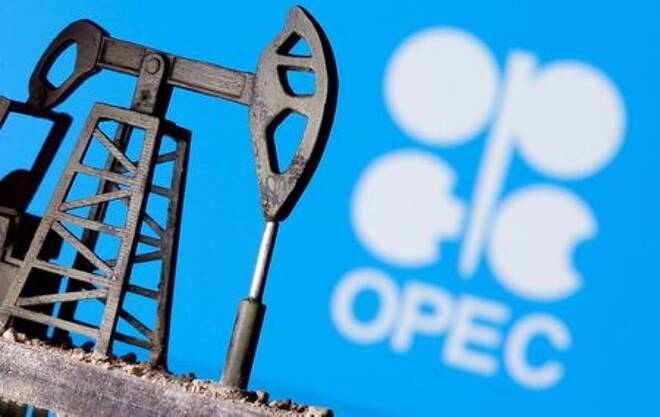Advertisement
Advertisement
OPEC+ Agrees Oil Supply Boost After UAE, Saudi Reach Compromise
By:
MOSCOW/DUBAI/LONDON (Reuters) -OPEC+ ministers agreed on Sunday to boost oil supply from August to cool prices which have climbed to 2-1/2 year highs as the global economy recovers from the coronavirus pandemic.
The group, which includes OPEC countries and allies like Russia, crucially agreed new production allocations from May 2022 after Saudi Arabia and others agreed to a request from the United Arab Emirates (UAE) that had threatened the plan.
“We are happy with the deal,” UAE’s Energy Minister Suhail bin Mohammed al-Mazroui told a news conference. Saudi energy minister Prince Abdulaziz bin Salman declined to answer questions on how the compromise was reached.
OPEC+ last year cut production by a record 10 million barrels per day (bpd) amid a pandemic-induced slump in demand and collapsing prices. It has gradually reinstated some supply to leave it with a reduction of about 5.8 million bpd.
From August until December 2021 the group will increase supply by a further 2 million bpd or 0.4 million bpd a month, OPEC said in a statement.[O/R] It aims to fully phase out cuts by around September 2022.
The group had agreed to extend their overall pact until the end of 2022 from an earlier planned date of April 2022, to leave more room for manoeuvre in case global recovery stalls due to new virus variants.
Whilst both Riyadh and the UAE had been supportive of an immediate output boost, the UAE had objected to the Saudi idea to extend the pact to December 2022 without getting a higher production quota.
To overcome the disagreement, OPEC+ agreed new output quotas for several members from May 2022, including the UAE, Saudi Arabia, Russia, Kuwait and Iraq.
The UAE will see its baseline production, from which cuts are being calculated, increase to 3.5 million bpd from May 2022 from today’s 3.168 million.
Saudi and Russia will see their baselines rise to 11.5 million bpd each from the current 11 million. Iraq and Kuwait will see their baselines rise by 150,000 bpd each.
Prince Abdulaziz said Nigeria and Algeria could also see their baselines revised.
He said OPEC+ would adjust its policy if and when Iranian oil returned to the market if the country reached a deal with world powers over its nuclear programme.
Iran is estimated to be able to add some 1.5 million bpd to global supply once the deal is reached and Western sanctions are lifted.
For a look at all of today’s economic events, check out our economic calendar.
(Reporting by Olesya Astakhova, Rania El Gamal, ALex Lawler, Ahmad Ghaddar, Vladimir Soldatkin and Dmitry Zhdannikov; Writing by Dmitry Zhdannikov; Editing by Elaine Hardcastle, Philippa Fletcher and Hugh Lawson)
About the Author
Reuterscontributor
Reuters, the news and media division of Thomson Reuters, is the world’s largest international multimedia news provider reaching more than one billion people every day. Reuters provides trusted business, financial, national, and international news to professionals via Thomson Reuters desktops, the world's media organizations, and directly to consumers at Reuters.com and via Reuters TV. Learn more about Thomson Reuters products:
Advertisement
